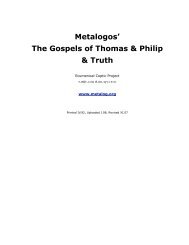Andrew Louth - Syriac Christian Church
Andrew Louth - Syriac Christian Church
Andrew Louth - Syriac Christian Church
You also want an ePaper? Increase the reach of your titles
YUMPU automatically turns print PDFs into web optimized ePapers that Google loves.
22 INTRODUCTION<br />
Councils, Saints, Sacraments. Scripture is absolutely primary.<br />
Maximus interprets it by analogy with the Incarnation: in it the Word<br />
of God draws near to human beings and Selects things which are<br />
familiar to them, combining together various stories, symbols,<br />
parables and dark sayings; and in this way He becomes flesh’ (CT II.<br />
60). Scripture is therefore the Word of God talking to human beings: it<br />
is our access to eternal truth. To understand it one needs to engage<br />
with the Word who speaks, enter into a relationship through which we<br />
are transformed and come to find the Word less strange, though not<br />
less awesome. The <strong>Church</strong>—all those incorporated into Christ through<br />
baptism—is where understanding of the Word takes place. The<br />
Fathers and the Saints are two categories (not separate, but distinct)<br />
of those who are being drawn into this process of understanding. To<br />
them Maximus attributes an authority scarcely less than that of the<br />
Scriptures. On several occasions (notably in the Ascetic Life and the<br />
Mystagogia) Maximus presents his teaching as something that he has<br />
learnt from an ‘old man’ (gerôn, the normal Greek term for a spiritual<br />
father): it is a way of clothing the teaching he has received in the<br />
mantle of a lived tradition, lived out in the ascetic struggle of the holy<br />
man or woman, or saint. In his scholia on passages from St Gregory of<br />
Nazianzus, whom he calls ‘the Theologian’, he seems to attribute to<br />
him virtual infallibility: Gregory is the ‘great and wonderful teacher’<br />
and Maximus never, in dealing with the difficult passages in his<br />
sermons, entertains the idea that the Theologian might have made a<br />
mistake (even in Amb. 21, where Gregory refers to John the<br />
Evangelist as the ‘Forerunner’, the title of John the Baptist). 5<br />
Tradition, witnessed to in Scripture and expounded by the Fathers, is<br />
there to be interpreted, not called in question. The councils of the<br />
<strong>Church</strong>—both local and Ecumenical— were also occasions on which<br />
the meaning of Tradition was authoritatively recognized, and<br />
acclaimed by the bishops gathered together in the Spirit. 6 Maximus<br />
does not all that often refer explicitly to the five Ecumenical Councils<br />
that by his time had already taken place. But he does something even<br />
more important: he makes the decisions of these councils a guide to<br />
the fundamental nature of reality and develops what we shall call a<br />
‘Chalcedonian logic’ which he uses as a powerful tool of theological<br />
elucidation. As well as at councils, the bishops exercise their authority<br />
as Fathers of the <strong>Church</strong> in their sermons, in which they expound the<br />
meaning of the Scriptures, almost invariably in a liturgical context.<br />
The authority of the Saints is manifest in their success (or better:<br />
progress) in the ascetic struggle. Here lies the importance of<br />
monasticism for Maximus, not that sanctity is confined to a monastic<br />
élite, but sanctity is the goal of the ascetic struggle that monks have<br />
set themselves to pursue without distraction, just as sanctity is the




